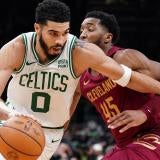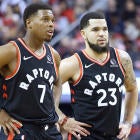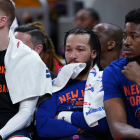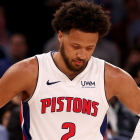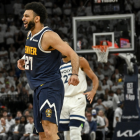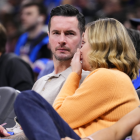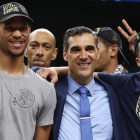
NBA history has one constant: If you lose a superstar in free agency, you get significantly worse. The Cleveland Cavaliers declined by an average of 35.5 wins in seasons immediately after losing LeBron James. The Oklahoma City Thunder came one game away from the 2016 NBA Finals with Kevin Durant and won only a single playoff game without him in 2017. Player empowerment's most obvious side effect is organizational disempowerment. Most teams go only as far as their stars take them.
It's what made the 2019-20 Raptors the feel-good story of the season, and maybe the decade. By nearly any measure, they were a better regular-season team without Kawhi Leonard than they were with him. They ended the shortened season on a 60-win pace with a better net rating than their championship counterparts, and they did it while enduring more injuries than the Leonard-led Raptors had to deal with. For a few months, it seemed as though Toronto had defied history.
And then the playoffs arrived, and history collected its debt. The Celtics beat the Raptors because they had superstars and the Raptors didn't. Now Toronto is a year away from recruiting another one. Its interest in Giannis Antetokounmpo is no secret. Plenty of other stars will hit the market as well, including their old friend, Leonard.
That's where things get complicated. The Raptors have proven their infrastructure's championship capabilities with the right star in place, but they're still a year away from actually having the chance to get that star. A lot can change in that time. Fred VanVleet, Marc Gasol and Serge Ibaka are free agents now. Kyle Lowry will be unrestricted in 2021. OG Anunoby is eligible for an extension now, and restricted in 2021. Siakam and Norman Powell are the only Raptors currently under guaranteed contracts for the 2021-22 season.
Toronto's entire appeal is based on the success those players had, both with and without Kawhi. If the Raptors keep all of them, they won't be able to afford Kawhi's replacement. Let too many of them go and that replacement won't be interested in replacing all of them. This preview will attempt to strike that balance for the Raptors. How can they keep a good enough roster to entice a superstar without sacrificing their ability to afford that star in the first place?
One note before beginning: We will be using Spotrac for player salaries, and 2019-20 cap numbers for this exercise as a whole. That includes previously agreed-upon numbers like the rookie scale and the minimum salary. A frozen cap is the likeliest outcome of negotiations between the league and the NBPA, but these numbers could theoretically change in either direction.
Under the assumption that the 2019-20 numbers will be used, these are the pertinent numbers for these projections.
Salary cap | $109,140,000 |
Luxury tax | $132,627,000 |
Luxury tax apron | $138,928,000 |
Salary floor | $98,226,000 |
Non-taxpayer mid-level exception (Year 1) | $9,258,000 |
Taxpayer mid-level exception (Year 1) | $5,718,000 |
Cap room mid-level exception (Year 1) | $4,767,000 |
Bi-annual exception | $3,623,000 |
Cap situation and overall finances
As amazing as it sounds, the Raptors could potentially have significant cap space to work with. Right now, they're almost $20 million below the projected cap line. Factor in Incomplete roster charges, and the Raptors could get to around $16.3 million in space without making a single move.
Players | 2020-21 Salary |
$30,559,200 (estimated) | |
$30,500,000 | |
$10,865,952 | |
$4,000,000 | |
$3,872,215 | |
Stanley Jonhson* | $3,804,150 |
$1,517,981 | |
$1,517,981 | |
$1,517,981 | |
No. 29 pick | $1,950,600 |
Total | $90,106,060 |
*Player option
*Non-guaranteed
(For an explanation of why Siakam's salary is estimated, see the Jamal Murray paragraph in the Nuggets preview.)
Obviously, creating cap space is not the goal here. At the very least, the Raptors would like to retain Fred VanVleet, and his contract alone would take them out of the cap space derby. If they keep Ibaka and Gasol as well, they're flirting with the luxury tax. But Gasol and Ibaka, given their ages, are likely luxuries. Neither should be expected to earn contracts greater than one year in length. The Raptors aren't sacrificing 2021 cap space for them.
VanVleet is obviously another story, especially as Lowry, who turns 35 in March, ages out of stardom. VanVleet, only 26, would be a perfect fit alongside any superstar Toronto could feasibly target. He's not only an elite defensive guard, but one capable of punching far above his weight class in terms of size (a trait he picked up from Lowry). He's a good enough shooter to function off the ball, as he often does off Lowry, but a better ball-handler than he gets credit for. Given the robust market he's expected to see in free agency, most teams seem to believe that he's capable of being a more traditional point guard in the right situation as well.
The Knicks and Pistons, who both figure to enter the offseason with max cap space, are the known suitors. The Phoenix Suns can join the party with one cap-dumping trade. Some team will have sign-and-trade interest. Technically, the Raptors can outbid everyone with their Bird rights. At a certain point, though, they'll start to feel the 2021 squeeze. Say, for instance, the cap rises only to $115 million in 2021. That was the pre-pandemic projected 2020 figure, it would set the max for Giannis at $34.5 million. Siakam and Powell account for $44.6 million, while Anunoby has a $9.7 million cap hold the Raptors would be foolish to renounce. Even if Toronto stripped away everything else besides VanVleet, it would have to deal with eight incomplete roster charges at the rookie minimum. We'll peg their combined total at around $7.5 million. Add that up and the Raptors have only $18.7 million or so left over for VanVleet, and that's before we account for the presence of first-round picks in the next two drafts that might need to be offloaded. Somebody else is probably going to offer VanVleet that much. That becomes a certainty if the Raptors prioritize keeping 2021 restricted free agent Terence Davis. That seems likely given his stellar rookie season, though an assault investigation could change that.
At the very least, retaining VanVleet likely prevents the Raptors from taking on any extra long-term money. The likelier outcome is that the Raptors look to offload Powell in the name of preserving 2021 cap space. Deep down, though, they probably have a walkaway number. There is an amount that they will decline to offer him, and Toronto's competition knows that. It makes the Raptors vulnerable in ways that tend to lead to players getting overpaid. If teams didn't sense that VanVleet was attainable, they wouldn't spend their precious free agency time on him, especially in a condensed offseason with very few marquee free agents.
If VanVleet does leave, the Raptors could theoretically pivot into another high-level 2020 free agent. There are two problems with that plan, though. The first is the cost to the 2020-21 roster. Using their cap space would mean renouncing their rights to Gasol and Ibaka, whom the Raptors would probably prefer to keep on one-year deals. The second is fit. Jerami Grant would work with most teams, but the Raptors are one of the few not in need of versatile defensive wings. Bogdan Bogdanovic is restricted, and neither he nor Joe Harris live up to their stringent defensive standards (though, in fairness, the Raptors may relax these if they expect Giannis to come in). No center has the right combination of shooting, defense and youth to make sense in Toronto's long-term plans. There are good players out there, but saving a few million dollars probably isn't worth the downgrade from VanVleet to any of these teams. The Raptors may not need to win the championship this season, but they need to remain competitive enough to entice a star.
On that front, the other option if the Raptors lose VanVleet is to keep their rights on Gasol and Ibaka, retain them on one-year deals, and use the non-taxpayer mid-level exception on a slightly worse free agent. Danilo Gallinari comes up in every preview as a veteran who wants to win, and he knows Masai Ujiri from their time together in Denver. It's slim pickings beyond him, though, as no guards can replicate VanVleet's all-around production and there's no reason to chase lesser forwards or bigs given their incumbent personnel.
A silver lining, though, would be the flexibility this path offers. If VanVleet leaves and the Raptors sign a one-year deal on the MLE, there are scenarios in which they remain competitive next season while approaching two max salary slots in the 2021 offseason by offloading Powell. Sure, Giannis, come on up, and while you're at it, bring a friend!
Still, Toronto should be viewed as the heavy favorite to retain VanVleet. Powell is so tradable that Ujiri can figure out the specifics later. Let's say VanVleet gets $20 million in the first year of his new deal. That leaves the Raptors around $22 million below the tax for four roster spots. Would they pay the tax? It's hard to say. They did so in 2019, and were completely prepared to make a historic payment in the neighborhood of $100 million to keep Kawhi Leonard and Danny Green last offseason.
Neither situation factored in lost pandemic revenue, and the Raptors may have to deal with the costs associated with temporary relocation if they can't play in Canada next season. Working in their favor is the expectation that they won't pay the tax in the 2021-22 season. It is typically difficult to pay the tax as a cap space team, and while Anunoby's new contract could get them there, that shouldn't be the expectation. Toronto paying the tax now is plausible, but not overly likely, and if nothing else, ownership would probably prefer to limit how far above the line this team goes. That is especially important in delaying a possible repeater clock.
With all of that in mind, retaining VanVleet likely means saying goodbye to either Ibaka or Gasol. One should get a hefty one-year deal, likely in the $12M-14M range, while the other will depart for greener pastures. Toronto could then use a portion of its MLE to replace whoever leaves. This is fortunately a deep center class, so players like Mason Plumlee, JaMychal Green, Tristan Thompson and Markieff Morris could be in the mix, depending on what skills Toronto prioritizes. The rest of the roster would be filled out with minimum salaries.
One last financial note to be addressed are the futures of Anunoby and Lowry. Anunoby's situation is unfortunate, but fairly common for late first-round picks. He is eligible for an extension right now, but the Raptors are not going to give it to him. Why? Because that extension is going to be expensive, and if he signs it before 2021 free agency, his cap number would be his new salary. If he doesn't sign an extension before then, however, his cap number as a restricted free agent whose rights the Raptors will retain is based on his draft position. As the No. 23 pick in 2017, that number is relatively low at only $9.7 million. Bam Adebayo is in the same position. Both can get new contracts in the 2021 offseason, but that bizarre quirk forces their teams to wait until after they've spent their cap space to give it to them. They will both play this season without long-term security. Another name who suffered through this indignity? Kawhi Leonard in San Antonio. Players tend not to like doing this.
Another unfortunate financial casualty here is Lowry. There is no way around this: Barring an enormous decline, there is absolutely no way the Raptors can keep Lowry at his fair price beyond this season if they plan to use max cap space. His 2021-22 cap hold is over $43 million. The Raptors will renounce him when the time to spend their space comes. He'd certainly be welcomed back if he wants to return, but he could do so for no more than the cap room mid-level exception. This is unlikely, but remember, the Raptors gave Lowry a one-year extension last offseason when they didn't need to. That doesn't mean they agreed to anything beyond it (legally, they couldn't), but there could have been a wink-wink agreement within those negotiations. The Raptors took care of Lowry in 2020. They might hope he takes care of them in 2021.
Neither situation figures to matter much in 2020, though. Lowry and Anunoby will be back next season. Joining them will be a rookie. In all likelihood, that rookie will be a project.
Draft capital
- 2020 picks: No. 29, No. 59
- Owed future first-round picks: N/A
- Incoming future first-round picks: N/A
Masai Ujiri has a type. He has made five first-round draft picks since taking over the Raptors, and all but Jakob Poeltl could be described broadly as athletic wings who couldn't shoot. He swings for the fences and often hits home runs. Siakam and Anunoby both came in the 20s. But then, so did Bruno Caboclo. The Raptors are fearless drafters. They trust their developmental infrastructure enough to take risky prospects.
There are plenty of names to watch on that front this time around. Jaden McDaniels and Cassius Stanley stand out as upside picks. Josh Green is a safer 3-and-D option. The Raptors could also make the cap play and take an international player to stash abroad for a few seasons. This is also the range of the first round in which teams routinely trade out for future picks. Boston, for instance, traded No. 24 last season to dump Aron Baynes' contract and Milwaukee's 2020 pick. Toronto could use a similar offer to get rid of Stanley Johnson's bad money.
What we can say relatively safely is that the No. 29 pick probably isn't going to impact Toronto's immediate fortunes too much. Siakam, Anunoby and Poeltl all played very limited roles as rookies. The Raptors draft for the future. This offseason, they may be trading for it as well.
Trade options
Let's get this out of the way: If the Raptors want to trade Powell now to ensure his contract doesn't clog their books in 2021, they'll have no trouble doing so. He just averaged a career-high 16 points per game on nearly 40 percent shooting while playing passable defense. He fits in anywhere, and he is owed only around $22 million for the 2021-22 and 2022-23 seasons combined. That is the sort of long-term money teams happily add. Some ideas:
- Golden State probably isn't using its $17.2 million Andre Iguodala trade exception, but if it does, Powell fits snugly within in. Eric Paschall makes sense as the return here, and the Raptors get the added bonus of not having to take back matching salary. Golden State's tax issues likely prevent this trade from becoming reality, though.
- Atlanta wants to win now, can absorb Powell's contract into cap space and has plenty of spare second-round picks to deal.
- Utah sorely needs bench help and could offer the expiring contracts of Ed Davis and Tony Bradley in addition to picks.
- A sneaky one if the Raptors want to give themselves another late-game offensive option: Powell for the expiring contract of Lou Williams. The Clippers have no reason not to take on long-term money, and Williams is redundant on a team with Kawhi. If the Raptors can cover for him defensively, he'd make a big difference in their late-game offense.
There are many, many more options here. Powell is one of the most tradable players in basketball. Toronto would have no trouble moving him.
The bigger name to watch here would be Lowry. Both sides probably recognize the obstacles standing between Lowry and retiring as a Raptor. Both sides would probably also prefer to make an earnest attempt at clearing them. The Raptors aren't prioritizing next season, but they aren't punting it away either. They were just a No. 2 seed that came a few shots short of the Eastern Conference finals. Lowry was their best player in the Boston series. Without him, Toronto is staring a first-round exit in the face.
The question the Raptors need to answer internally is how far away they are from that even with Lowry. They aren't better than the Bucks or Celtics at this moment. They didn't play the Heat, but Miami beat Boston. Brooklyn has to figure in here somewhere, and Philadelphia could do something wild with Daryl Morey and Doc Rivers in place. Lowry is not getting younger and some of Toronto's front-court depth is probably departing. It's not crazy to suggest that a minor dip in performance could send the Raptors plummeting down the standings.
But Siakam, Anunoby and VanVleet are young enough to improve. The Raptors pull diamonds out of the rough every year. It's just as possible that Toronto repeats its stellar 2019-20 performance, which it would probably prefer as a recruiting measure. That makes a Lowry trade unlikely at the moment. If one comes, it would probably be during the season. Yes, that leaves room for Lowry to decline and lose value, but the Raptors probably aren't haggling too much over Lowry anyway. He's 34 and on an expiring contract. His trade value isn't that high to begin with, no matter how valuable he actually is as a player. If the Raptors are on pace to disappoint, the Lowry rumors will be justified. Until that happens, though, we should assume he remains in place.
Where might he go if he is dealt? It would have to be a team with plenty of expiring salary and some draft capital to offer. Miami has the former but not the latter, and besides, the Raptors won't want to help a fellow Giannis suitor. Philadelphia has the picks, but not the expiring salaries. The Lakers have both, and might prefer a one-year commitment to Lowry over a two-year commitment to Chris Paul if they choose to trade for a high-level point guard. Dallas is another team to watch here. The Mavericks want a third star. Lowry could be that star without crippling their cap sheet, but Dallas faces the same Giannis concerns as Miami. Utah has Mike Conley's expiring salary to dangle with picks as well. There are possibilities here, but don't hold your breath on an offseason trade.
Alright, put on your tinfoil hats folks. This one is grounded in nothing but speculation, but hear me out: Kawhi Leonard refused to sign with the Clippers until they acquired Paul George. He wanted to play with another superstar, and he didn't think Siakam was that player. His fears were confirmed in the playoffs.
The Toronto Star's Bruce Arthur reported after the fact that the Thunder and Raptors discussed a George trade before he went to the Clippers. Oklahoma City asked for four first-round picks, Siakam and VanVleet. The Raptors justifiably said no, but it's fair to wonder if there was a realistic price the Thunder could have set. If it was merely Siakam and two or three picks, might they have considered trading for George to keep Leonard?
We don't know, but we soon might. The Raptors are going big-game hunting again in 2021. What happens if another superstar doubts Siakam? They very well might. If Giannis leaves the Bucks, he'll probably do so in search of a teammate that can cover for his playoff shortcomings in ways that Siakam, at this point, can't. The Raptors don't have that kind of player right now. Maybe dangling Siakam could change that. Imagine a world in which Giannis wants to play with Bradley Beal. Siakam is a compelling starting point in those discussions.
This is, for now, unrealistic. There is no reporting behind it. But there was no reporting behind George's availability either. The Clippers got that deal done and secured Kawhi as a result. Teams do what it takes to get stars. In a year, that might mean cutting bait on Siakam. For now, though, we'll focus on more realistic pursuits.
What would an ideal offseason look like?
One of the keys to clearing cap space for a star free agent is discerning which players are luxuries and which ones are true necessities in the recruiting effort. Toronto had one of the deepest rosters in the NBA last season, but when it comes to Giannis or any other 2021 free agent, only three players genuinely matter: Siakam, Anunoby and VanVleet. Yes, Gasol, Ibaka and Lowry were essential to last season's success, but the three teammates that would ultimately determine a new superstar's ability to contend for championships in Toronto are the three younger Raptors starters. Keeping them in place is what matters. Everybody else is a luxury. If that means giving VanVleet $20 million per year? Then so be it.
Still, the Raptors don't need to be hasty in clearing the decks. They need to remain competitive enough to remain viable to star free agents. In that vein, trading Lowry right now doesn't make sense. Trading Powell might, but only if the expiring salary they get back can help them. His salary is so small and there will be so much available space in 2021 that if they need to dump him for nothing next summer, doing so won't be a problem.
The last major question becomes the decision between Gasol and Ibaka, if one is even needed. Gasol's age and bubble struggles probably make Ibaka the priority, but as long as the Raptors keep one, they'll be in good shape. They don't need to be picky positionally with the mid-level exception. The Raptors are strong almost everywhere. If the addition can shoot and defend passably, he'll be fine.
These are half measures, but necessary ones. The Raptors have now seen what truly matters in back-to-back playoff runs. The Raptors could re-sign their veterans to long-term deals or chase bigger names through trade, but they know from experience that it would amount to little more than shuffling deck chairs on the Titanic. If Toronto is going to make it back to the Finals, it has to come with a 2021 superstar. Every move it makes this offseason needs to build toward that chase. If that means sacrificing a bit of last season's No. 2 seed? That's just the cost of pursuing a championship. The Raptors knew that when they traded for Leonard in 2018, and if there were any doubts, they know it for certain now.







